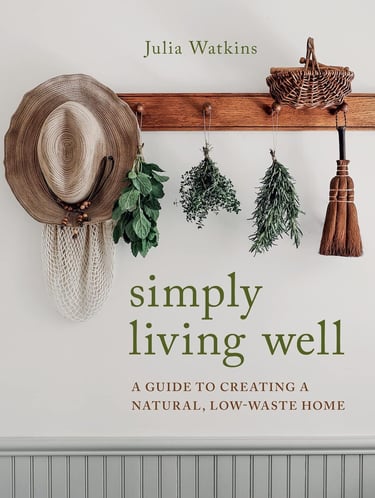Review of 'Simply Living Well'
'Simply Living Well' by Julia Watkins is more than just a guide; it serves as an invitation to embrace a lifestyle that emphasizes sustainability and simplicity. In a world increasingly characterized by consumerism and environmental degradation, Watkins' book provides a refreshing perspective grounded in her beliefs and experiences. Watkins, a passionate advocate for sustainable living, draws from her own life as she encourages readers to consider their consumption habits, food choices, and overall impact on the planet.
Key Concepts and Ideas
In her book 'Simply Living Well', Julia Watkins presents a holistic approach to sustainable living that emphasizes practical lifestyle changes and conscious consumption. Central to her philosophy is the idea of reducing one’s ecological footprint by embracing principles of stewardship towards the environment. A significant concept promoted by Watkins is seasonal eating. This practice encourages individuals to consume fruits and vegetables that are in season, which not only enhances flavor but also reduces the carbon footprint associated with transportation and storage of out-of-season produce. For instance, Watkins provides a thoughtful guide on how to incorporate seasonal foods into weekly meal planning, making it easier for readers to access and enjoy local fare.
Another foundational aspect of the book is the promotion of do-it-yourself (DIY) practices. Watkins shares various simple projects that encourage readers to create their own home products, including cleaning supplies and personal care items. This approach not only fosters creativity but also reduces dependency on commercial products that often contain harmful chemicals. For example, readers can learn how to make an all-purpose cleaner using vinegar and essential oils, a cost-effective and environmentally friendly alternative.
Watkins also emphasizes the use of natural home products as a means to cultivate a healthier living environment. She advocates for using biodegradable and non-toxic materials for home maintenance, which are beneficial for both personal health and the planet. Practical examples are interwoven throughout the text, guiding readers in selecting eco-friendly items and suggesting methods to enhance indoor air quality naturally.
Through these key concepts—sustainable living, seasonal eating, DIY practices, and natural home products—Julia Watkins illustrates how simple adjustments can create a more balanced and eco-conscious lifestyle. Each idea encourages readers to reflect on their habits, fostering a deeper connection with their surroundings.
Practical Tips and Recipes
In 'Simply Living Well' by Julia Watkins, several practical tips and recipes are shared that resonate deeply with individuals seeking a simpler, more sustainable lifestyle. At the heart of these teachings is the concept of embracing seasonal meals, which not only enhances the dining experience but also promotes environmental consciousness. One standout recipe is the autumn vegetable soup, made with locally sourced ingredients such as squash, kale, and carrots. This dish showcases how flavorful, nutritious meals can be prepared using what is readily available in one's region. Furthermore, Watkins encourages readers to experiment with seasonal produce, fostering a deeper connection to the local ecosystem.
Another notable aspect of the book is its guidance on creating homemade cleaners. Instead of relying on chemical-laden products, Watkins suggests simple mixtures that utilize common household items, such as vinegar, baking soda, and essential oils. For instance, a multi-purpose cleaner can be easily made by blending vinegar with citrus peels, offering a natural alternative that is just as effective. These DIY solutions not only contribute to a healthier home environment, but they also align with the principles of mindfulness by encouraging readers to be more deliberate about the products they consume and use daily.
Additionally, Watkins emphasizes the importance of mindful living, urging readers to reflect on their consumption habits and make conscious choices that enhance overall well-being. Resources included in the book, such as guides to decluttering and tips on cultivating a gratitude practice, serve to inspire a more intentional approach to life. By integrating these actionable pieces of advice, individuals can gradually ease into a lifestyle that prioritizes sustainability, simplicity, and fulfillment.
Personal Reflection and Conclusion
Reading 'Simply Living Well' by Julia Watkins has been a transformative experience that deepened my understanding of sustainable living and minimalism. This book illuminates the profound impact that our lifestyle choices have on both the environment and our well-being. Watkins navigates the complexities of modern living with grace, encouraging individuals to embrace simplicity through practical advice and relatable anecdotes. Her insights into minimizing waste and cultivating an eco-friendly home resonate powerfully, prompting reflection on my own consumption habits.
One of the key takeaways from the book is the notion of intentional living. Watkins emphasizes that every action, no matter how small, contributes to a larger narrative of sustainability. This perspective has encouraged me to evaluate the objects I own and the products I purchase. I found myself consciously reducing superfluous consumption and opting for items that are not only functional but also environmentally responsible. Watkins’ guidance on creating a balanced home life, from thoughtful meal planning to mindfulness in daily practices, fosters a deeper appreciation for simplicity.
The impact of 'Simply Living Well' extends beyond personal habits; it invites readers to consider their roles within a broader community. The concept of sharing resources and embracing local produce empowers individuals to connect with their neighbors and support sustainable practices. As I reflect on my journey influenced by this book, I feel a renewed commitment to leading a more meaningful life that prioritizes sustainability.
In conclusion, 'Simply Living Well' serves as a valuable resource for anyone seeking to harmonize their lifestyle with the principles of sustainability and minimalism. Julia Watkins’ work encourages us to examine our choices critically and engage in practices that promote a healthier planet. I invite readers to explore her insights and consider how they can incorporate these principles into their own lives, fostering a collective commitment to a sustainable future.


